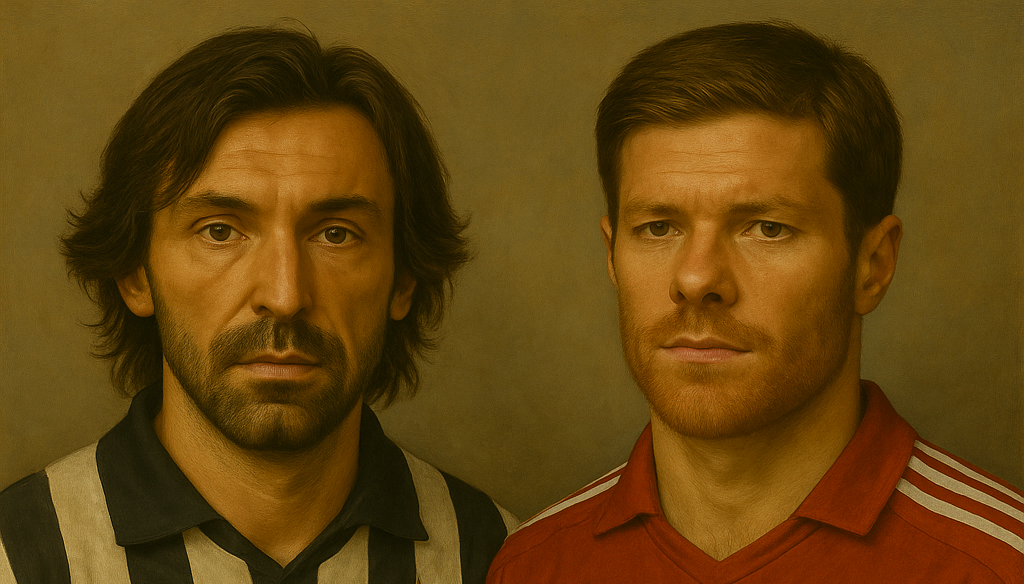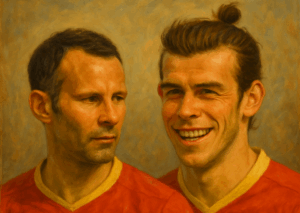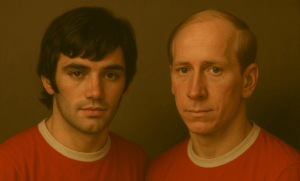
The GOAT of the 2000s Conductors of Football?
In 2025, as football’s tactical paradigm has undergone yet another evolution, we look back at two midfielders who defined an era: Andrea Pirlo and Xabi Alonso. Their rivalry was more than just a comparison of two outstanding players; it signified a clash of two different philosophies within the sport of football. One was an artist who used the pitch as his canvas to create unpredictable art. The other was an architect who perfectly designed the balance of the colossal structure that was his team.
Pirlo was the revolutionary who brought the ‘regista’ role to the center of modern football. In contrast, Alonso was the symbol of tactical intelligence, boasting perfect balance on both offense and defense. This article will take an in-depth look at the playing styles, careers, and decisive head-to-head battles of these two maestros to trace the great footprints they left on 21st-century football history.
1. Analysis of Playing Style: The Artist vs. The Architect
Andrea Pirlo: The Maestro Who Made the Pitch His Canvas
Redefining the Regista: I Think, Therefore I Play
Pirlo was the player who redefined the ‘Regista’ role in modern football. His play, much like the title of his autobiography, “I Think, Therefore I Play,” was the result of philosophical thought.
Johan Cruyff: “Pirlo can do anything he wants with his feet. He’s a genius.”
The Aesthetics of Passing and Set-Pieces: A Silent Leadership
Each of his passes was a clear instruction sent to the entire team. He created the team’s rhythm not only with killer passes that broke down defensive lines but also with short passes that controlled the tempo of the game. He is also considered one of the greatest free-kick specialists in football history.
Xabi Alonso: The Strategist Who Balanced the Team
The Complete Midfielder: A Master of Both Offense and Defense
Alonso went beyond being just the starting point of an attack; he also showed an exceptional ability to bring defensive stability to the team and win back possession. He was a player with perfect balance on both sides of the ball.
José Mourinho: “He is a manager on the pitch.”
The Precision of the Long Pass and Tactical Flexibility
Alonso’s passing was more akin to ‘strategy,’ traversing the vast pitch to switch the team’s direction of attack. His accurate long-range passes were a powerful weapon that could instantly neutralize the opponent’s press. Furthermore, he proved his incredible tactical flexibility by performing at the highest level in La Liga, the Premier League, and the Bundesliga.
2. Career Comparison: The Record of Numbers and Glory
Total Club Career Statistics
| Player | Clubs | Seasons | Appearances | Goals | Assists |
|---|---|---|---|---|---|
| Andrea Pirlo | Brescia, Inter, AC Milan, Juventus, New York City | 1995–2017 | 756 | 73 | 118+ |
| Xabi Alonso | Real Sociedad, Liverpool, Real Madrid, Bayern Munich | 1999–2017 | 701 | 44 | 60+ |
Major Honors and Individual Awards
| Category | Andrea Pirlo | Xabi Alonso |
|---|---|---|
| League Titles | 6 (Serie A) | 3 (1 La Liga, 2 Bundesliga) |
| UEFA Champions League | 2 (2003, 2007) | 2 (2005, 2014) |
| FIFA World Cup | 1 (2006) | 1 (2010) |
| Continental Championship | – | 2 (Euro 2008, 2012) |
| Domestic Cups | 2 (Coppa Italia) | 3 (FA Cup, Copa del Rey, DFB-Pokal) |
| Key Individual Awards | 2006 World Cup Bronze Ball | 2x FIFPro World XI |
3. Clash of the Century: An Analysis of Tactical Battlegrounds
The Miracle of Istanbul and the Revenge in Athens: 2005 & 2007 Champions League Finals
The 2005 Istanbul final starkly showed the styles and dynamics of the two players. In the first half, AC Milan, centered around Pirlo, dominated the game. However, in the second half, Liverpool made a tactical change, using Alonso and Hamann to specifically mark Pirlo, leading to a miraculous comeback. In the revenge match in Athens two years later, Milan secured a 2-1 victory with Pirlo orchestrating the game stably behind a more solid defensive shield.
The Pinnacle of Tiki-Taka: The Euro 2012 Final
In this match, Alonso’s Spain dismantled Pirlo’s Italy 4-0. Spain’s midfield trio of Alonso, Xavi, and Iniesta dominated the center of the park, completely cutting off the supply to Pirlo. This match proved how Alonso’s ‘invisible’ control could neutralize Pirlo’s ‘visible’ genius.
Key Head-to-Head Record
| Date | Competition | Match | Result | Pirlo’s Team | Alonso’s Team |
|---|---|---|---|---|---|
| 2005-05-25 | Champions League | AC Milan vs Liverpool | 3-3 (2-3 p) | AC Milan | Liverpool |
| 2007-05-23 | Champions League | AC Milan vs Liverpool | 2-1 | AC Milan | Liverpool |
| 2012-07-01 | Euro 2012 | Spain vs Italy | 4-0 | Italy | Spain |
4. Peer Reviews: What They Said About Pirlo and Alonso
On Pirlo: ‘The Genius’
- Gennaro Gattuso: “Let’s not confuse Nutella with high-quality chocolate.”
- Marcello Lippi: “A silent leader who speaks with his feet.”
On Alonso: ‘The Perfect Pro’
- Steven Gerrard: “The best central midfielder I’ve ever played with.”
- José Mourinho: “He is already a manager on the pitch.”
Conclusion: Looking Back at the Two Maestros in 2025
Andrea Pirlo and Xabi Alonso. Their rivalry was like a proxy war between two different values that football pursues: ‘art’ and ‘architecture.’
- Pirlo: The Revolutionary Artist
He was a revolutionary artist whose value was maximized only when the team was rebuilt around him. He brought the forgotten role of the regista back to the center of modern football, and his play inspired countless future playmakers. - Alonso: The Perfect Strategist
He was the perfect strategist who could blend into any system and make that team stronger. He served under various master tacticians, functioning as a key component that enhanced the team’s tactical perfection. His success as a manager is another example that proves how outstanding his football intelligence was.
Ultimately, there is no single right answer to the question of who was the greater player. It is like asking whether a painting by Picasso is greater than a building by Gaudí. Does your football get excited by Pirlo’s unpredictable pass, or does it feel secure in Alonso’s flawless game management? The answer lies in your own football philosophy.




